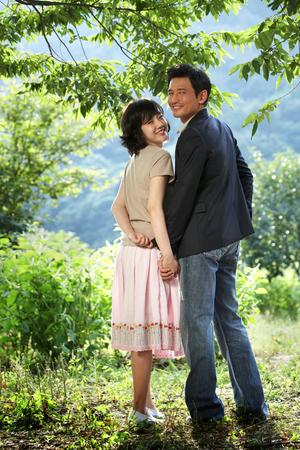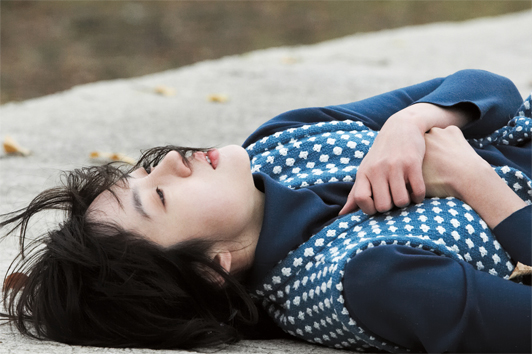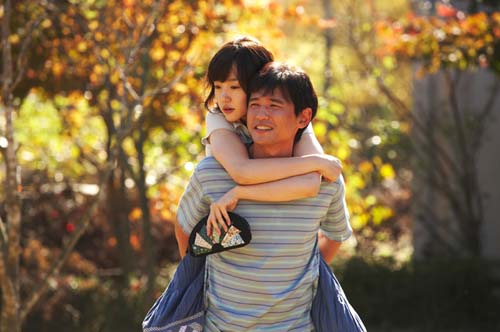Ways to Happiness, Easy and Hard
- About the film Happiness
By Jo Charm-hun, Special Reporter
“And remember this: that if you have been hated, you have also been loved.”
-Excerpt from Henry James’ The Portrait of a Lady
Why is life painful like that? Why are we so stupid like that? These are questions thrown out when the movie Happiness ends. The movie, the fourth directed by Huh Jin-ho, well-known for making “Politique Des Auteurs” melodramas in Korea, is not about happiness but about the agony of love and life.

Love, the Cruel Happiness
Key words of Happiness include love, happiness, parting, grief and life. Many people know that love could become happiness, joyfulness and sadness. Happiness tells us about the happiness of love and at the same time its pain makes us ponder what love is, what happiness is and how should we love each other, ultimately leading us to the questions of what life is and how we should live our life.
The movie begins with the entry of the main actor, “Young-soo (Hwang Jung-min),” into a nursing facility named “the House of Hope” in the countryside far from Seoul, right after he becomes bankrupt. The facility is a very important setting of this film, and its symbolic name is kind of ironic because hopeless people live here seeking hope in spite of their fatal diseases.
There a cynical and depressed man starts to discover some hope and other joys different from his previous city life that was full of alcohol, cigarettes, dancing and sex, gradually adapting to the rural life in the country. At this time the main actress, “Eun-hee (Im Soo-jung),” comes out as a salvation for him. Although she is also a serious patient, living there for eight years, she has a noticeably sound mind and is eager to love somebody passionately. “Shall we live together? I don’t know what our future will be. Anyway, we might break up some day if we’re wrong.” She directly and boldly brings him into her life hesitating what to do in front of the new and sudden love. Finally the two lovers leave there full of hope about their new life on a very bright summer day.
Eun-hee does live day by day finding and feeling happiness of each day without thinking about tomorrow. She looks much healthier than him to us. But the heart of Eun-hee is so sore now. Young-soo gradually resumes his days full of impulses and lusts sometimes thinking of tomorrow. “At first I thought I could not live without you, but right now I am likely to be crazy because of you.” At last, Young-soo leaves her with his recovered health in the pursuit of his previous pleasures of city life. There are only memories left for her of a short love and happiness, and the deep agony of the very cruel parting. Her crazy crying out within the inexpressibly lovely scenery of Korean autumn was completely emotional. All of them were right our vivid and lively stories. In the following year she dies, and as you can expect enough, his life falls apart.

The sun also rises. But the sun here is that of Hemingway, never the fresh, brilliant and hopeful one. Many people apparently look healthy and happy, but in reality, they might be so sick physically and mentally. Nonetheless, they cannot leave the difficult situation. A complete breakdown only leads them to another world of different ideas and ways of life. But they will eventually return to their past life and forget the lessons they have learned after some time. So is it about love. Many people tend to believe that their current love and happiness will last forever. But their feeling of love and happiness subsides a lot faster than they expected. And then they leave, seeking a new love that might be far away. It is us, or a sad self-portrait of us.
This action is a kind of stupidity that we feel about the meeting, loving and parting, and all the pain, watching the film. Analyzing the movie, we think Young-soo is really bad and stupid as he abandons the lovely and faithful Eun-hee so cruelly. But he portrays us, me and you in reality. The movie does not say anything; there are not any criticisms and comments, about all the actions. It is just about showing. To feel the characters pains is our decision. This is the typical style of the director Huh Jin-ho. He is extremely sparing in his words here, just like all of his famous previous works: Christmas In August (1997), One Fine Spring Day (2001) and April Snow (2005).
Is brief love with a deep grief really meaningless? Is it really impossible to get eternal love and happiness? Why do we miss our precious things right around us so foolishly? Can we not really get out of our stupidity? There are no answers. Nature, the quiet country or the House of Hope is not the shelter or something like Buddhism. It is not suggested as a solution, either. It just exists there as Eun-hee’s nodding coming out of very deep understanding about life in the last scene, and it faintly shows that the cause of the lovers’ parting lies considerably in themselves or their changeable heart rather than in outer elements.
At last, Eun-hee dies, nodding her head in tears to show him her complete misery. When Young-soo quietly walks into the House of Hope again in the snowy winter, only the song “To the land of Happiness” is surrounding and soothing him on his way back. We, the audience can slightly guess that there is a little hope of life that is being suggested at the ending scene, but the true answers about all the questions of love, happiness and life are still left up to each of us.

[278Review]

